Applying Psychological Concepts: Mastering Interpersonal Skills
VerifiedAdded on 2021/12/08
|6
|1527
|260
Essay
AI Summary
This essay delves into the application of psychological concepts in understanding and improving interpersonal skills. It begins by examining the influence of social roles on emotional expression, highlighting the need for individuals to manage their emotions effectively in various contexts. The essay addresses the fear of self-disclosure, particularly in situations where individuals worry about negative repercussions for expressing their opinions, and suggests behavioral therapies and counseling as potential solutions. It also touches on the concept of emotional contagion and the importance of group discussions in enhancing adjustability and cultural diversity. Furthermore, the essay discusses transactional communication, emphasizing its two-way nature and the challenges of resistance to change. It also differentiates between intentional and unintentional communication, cautioning against slips of the tongue. Lastly, the essay explores the content and relational dimensions of communication, advocating for negotiation and psychological therapies to manage conflicts and ensure ethical practices, the document is available on Desklib along with other solved assignments.

Running head: PSYCHOLOGY (INTERPERSONAL SKILLS)
Applying psychological concepts in real life
Name of the student:
Name of the university:
Author note:
Applying psychological concepts in real life
Name of the student:
Name of the university:
Author note:
Paraphrase This Document
Need a fresh take? Get an instant paraphrase of this document with our AI Paraphraser
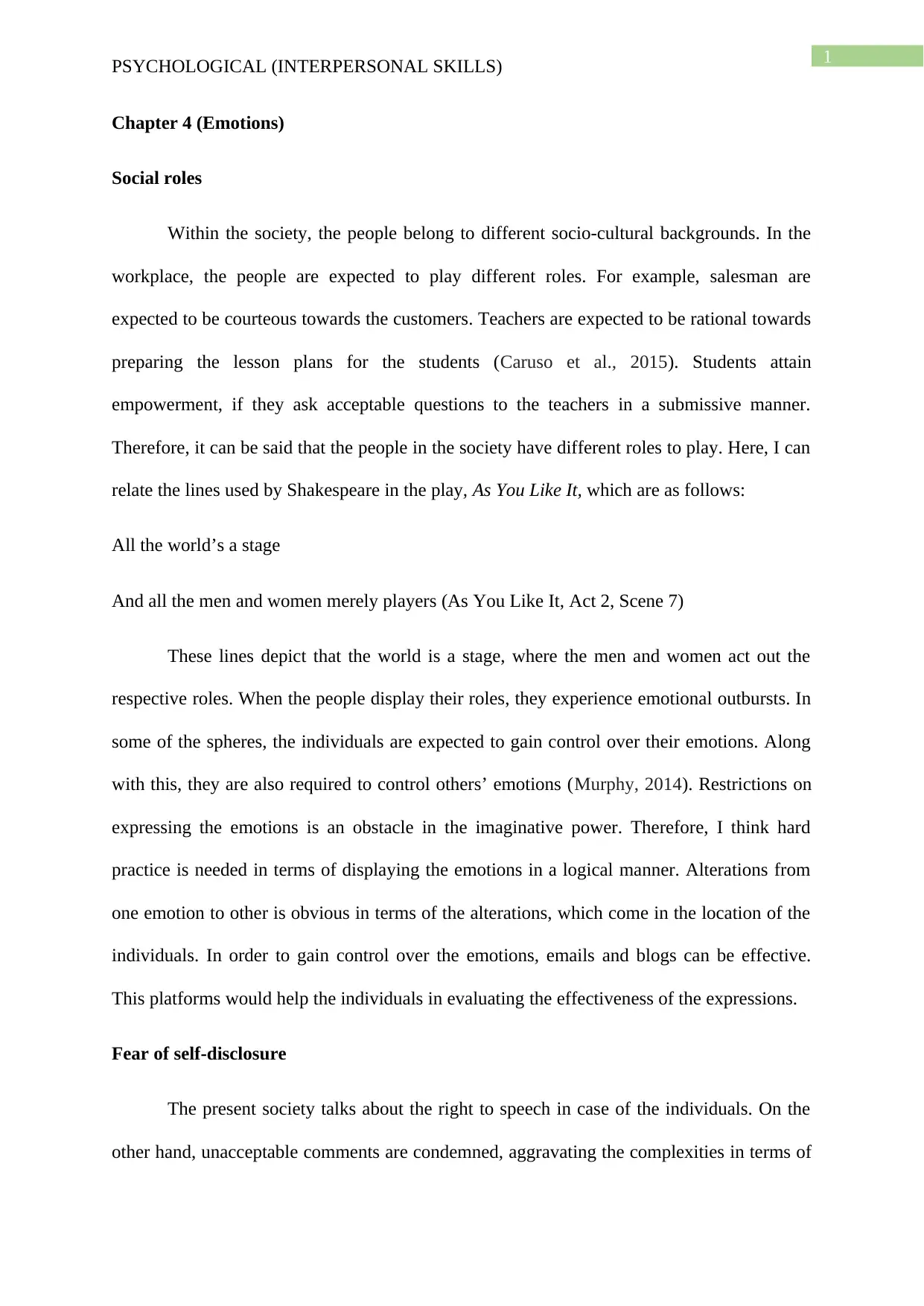
1
PSYCHOLOGICAL (INTERPERSONAL SKILLS)
Chapter 4 (Emotions)
Social roles
Within the society, the people belong to different socio-cultural backgrounds. In the
workplace, the people are expected to play different roles. For example, salesman are
expected to be courteous towards the customers. Teachers are expected to be rational towards
preparing the lesson plans for the students (Caruso et al., 2015). Students attain
empowerment, if they ask acceptable questions to the teachers in a submissive manner.
Therefore, it can be said that the people in the society have different roles to play. Here, I can
relate the lines used by Shakespeare in the play, As You Like It, which are as follows:
All the world’s a stage
And all the men and women merely players (As You Like It, Act 2, Scene 7)
These lines depict that the world is a stage, where the men and women act out the
respective roles. When the people display their roles, they experience emotional outbursts. In
some of the spheres, the individuals are expected to gain control over their emotions. Along
with this, they are also required to control others’ emotions (Murphy, 2014). Restrictions on
expressing the emotions is an obstacle in the imaginative power. Therefore, I think hard
practice is needed in terms of displaying the emotions in a logical manner. Alterations from
one emotion to other is obvious in terms of the alterations, which come in the location of the
individuals. In order to gain control over the emotions, emails and blogs can be effective.
This platforms would help the individuals in evaluating the effectiveness of the expressions.
Fear of self-disclosure
The present society talks about the right to speech in case of the individuals. On the
other hand, unacceptable comments are condemned, aggravating the complexities in terms of
PSYCHOLOGICAL (INTERPERSONAL SKILLS)
Chapter 4 (Emotions)
Social roles
Within the society, the people belong to different socio-cultural backgrounds. In the
workplace, the people are expected to play different roles. For example, salesman are
expected to be courteous towards the customers. Teachers are expected to be rational towards
preparing the lesson plans for the students (Caruso et al., 2015). Students attain
empowerment, if they ask acceptable questions to the teachers in a submissive manner.
Therefore, it can be said that the people in the society have different roles to play. Here, I can
relate the lines used by Shakespeare in the play, As You Like It, which are as follows:
All the world’s a stage
And all the men and women merely players (As You Like It, Act 2, Scene 7)
These lines depict that the world is a stage, where the men and women act out the
respective roles. When the people display their roles, they experience emotional outbursts. In
some of the spheres, the individuals are expected to gain control over their emotions. Along
with this, they are also required to control others’ emotions (Murphy, 2014). Restrictions on
expressing the emotions is an obstacle in the imaginative power. Therefore, I think hard
practice is needed in terms of displaying the emotions in a logical manner. Alterations from
one emotion to other is obvious in terms of the alterations, which come in the location of the
individuals. In order to gain control over the emotions, emails and blogs can be effective.
This platforms would help the individuals in evaluating the effectiveness of the expressions.
Fear of self-disclosure
The present society talks about the right to speech in case of the individuals. On the
other hand, unacceptable comments are condemned, aggravating the complexities in terms of
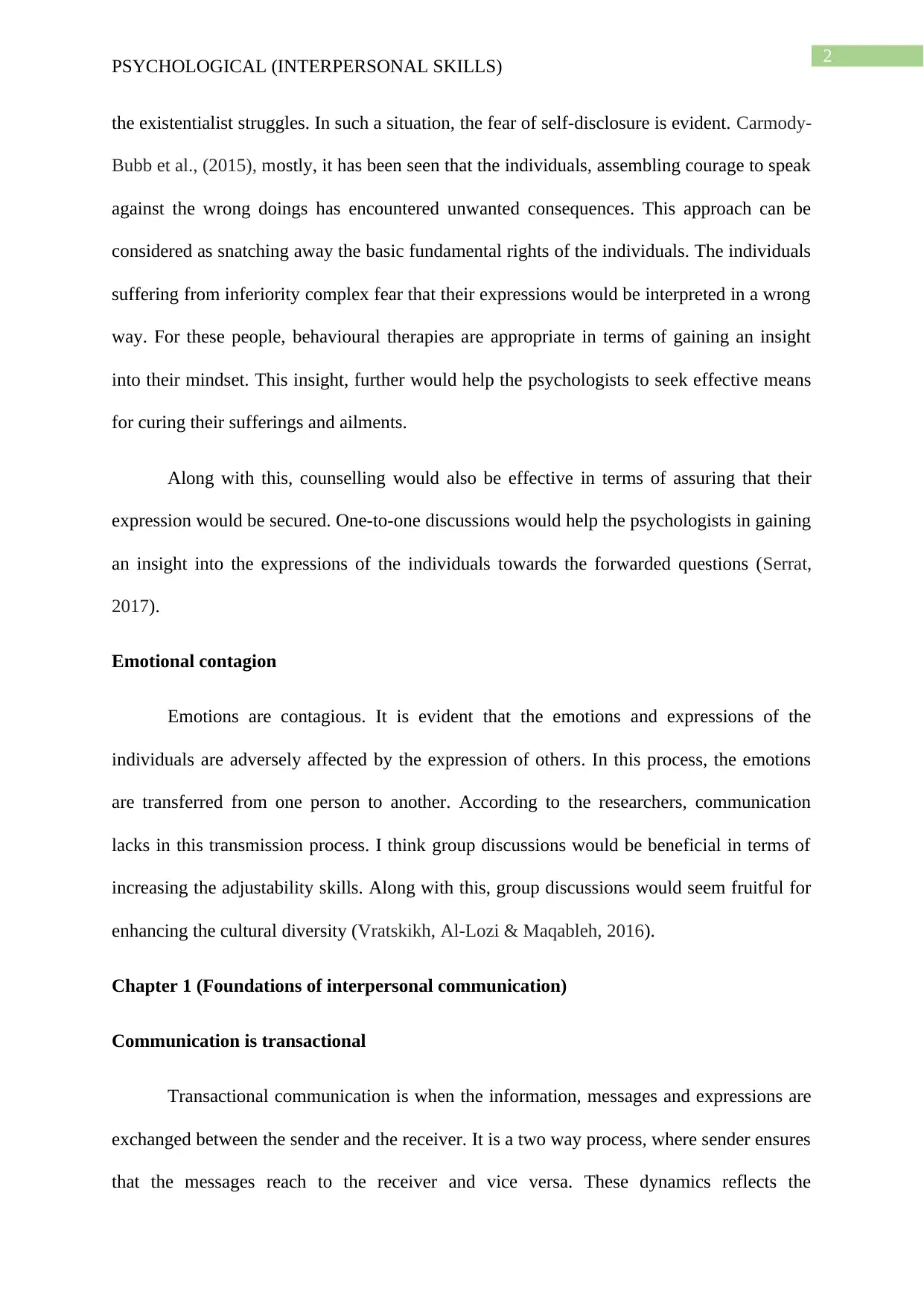
2
PSYCHOLOGICAL (INTERPERSONAL SKILLS)
the existentialist struggles. In such a situation, the fear of self-disclosure is evident. Carmody-
Bubb et al., (2015), mostly, it has been seen that the individuals, assembling courage to speak
against the wrong doings has encountered unwanted consequences. This approach can be
considered as snatching away the basic fundamental rights of the individuals. The individuals
suffering from inferiority complex fear that their expressions would be interpreted in a wrong
way. For these people, behavioural therapies are appropriate in terms of gaining an insight
into their mindset. This insight, further would help the psychologists to seek effective means
for curing their sufferings and ailments.
Along with this, counselling would also be effective in terms of assuring that their
expression would be secured. One-to-one discussions would help the psychologists in gaining
an insight into the expressions of the individuals towards the forwarded questions (Serrat,
2017).
Emotional contagion
Emotions are contagious. It is evident that the emotions and expressions of the
individuals are adversely affected by the expression of others. In this process, the emotions
are transferred from one person to another. According to the researchers, communication
lacks in this transmission process. I think group discussions would be beneficial in terms of
increasing the adjustability skills. Along with this, group discussions would seem fruitful for
enhancing the cultural diversity (Vratskikh, Al-Lozi & Maqableh, 2016).
Chapter 1 (Foundations of interpersonal communication)
Communication is transactional
Transactional communication is when the information, messages and expressions are
exchanged between the sender and the receiver. It is a two way process, where sender ensures
that the messages reach to the receiver and vice versa. These dynamics reflects the
PSYCHOLOGICAL (INTERPERSONAL SKILLS)
the existentialist struggles. In such a situation, the fear of self-disclosure is evident. Carmody-
Bubb et al., (2015), mostly, it has been seen that the individuals, assembling courage to speak
against the wrong doings has encountered unwanted consequences. This approach can be
considered as snatching away the basic fundamental rights of the individuals. The individuals
suffering from inferiority complex fear that their expressions would be interpreted in a wrong
way. For these people, behavioural therapies are appropriate in terms of gaining an insight
into their mindset. This insight, further would help the psychologists to seek effective means
for curing their sufferings and ailments.
Along with this, counselling would also be effective in terms of assuring that their
expression would be secured. One-to-one discussions would help the psychologists in gaining
an insight into the expressions of the individuals towards the forwarded questions (Serrat,
2017).
Emotional contagion
Emotions are contagious. It is evident that the emotions and expressions of the
individuals are adversely affected by the expression of others. In this process, the emotions
are transferred from one person to another. According to the researchers, communication
lacks in this transmission process. I think group discussions would be beneficial in terms of
increasing the adjustability skills. Along with this, group discussions would seem fruitful for
enhancing the cultural diversity (Vratskikh, Al-Lozi & Maqableh, 2016).
Chapter 1 (Foundations of interpersonal communication)
Communication is transactional
Transactional communication is when the information, messages and expressions are
exchanged between the sender and the receiver. It is a two way process, where sender ensures
that the messages reach to the receiver and vice versa. These dynamics reflects the
⊘ This is a preview!⊘
Do you want full access?
Subscribe today to unlock all pages.

Trusted by 1+ million students worldwide
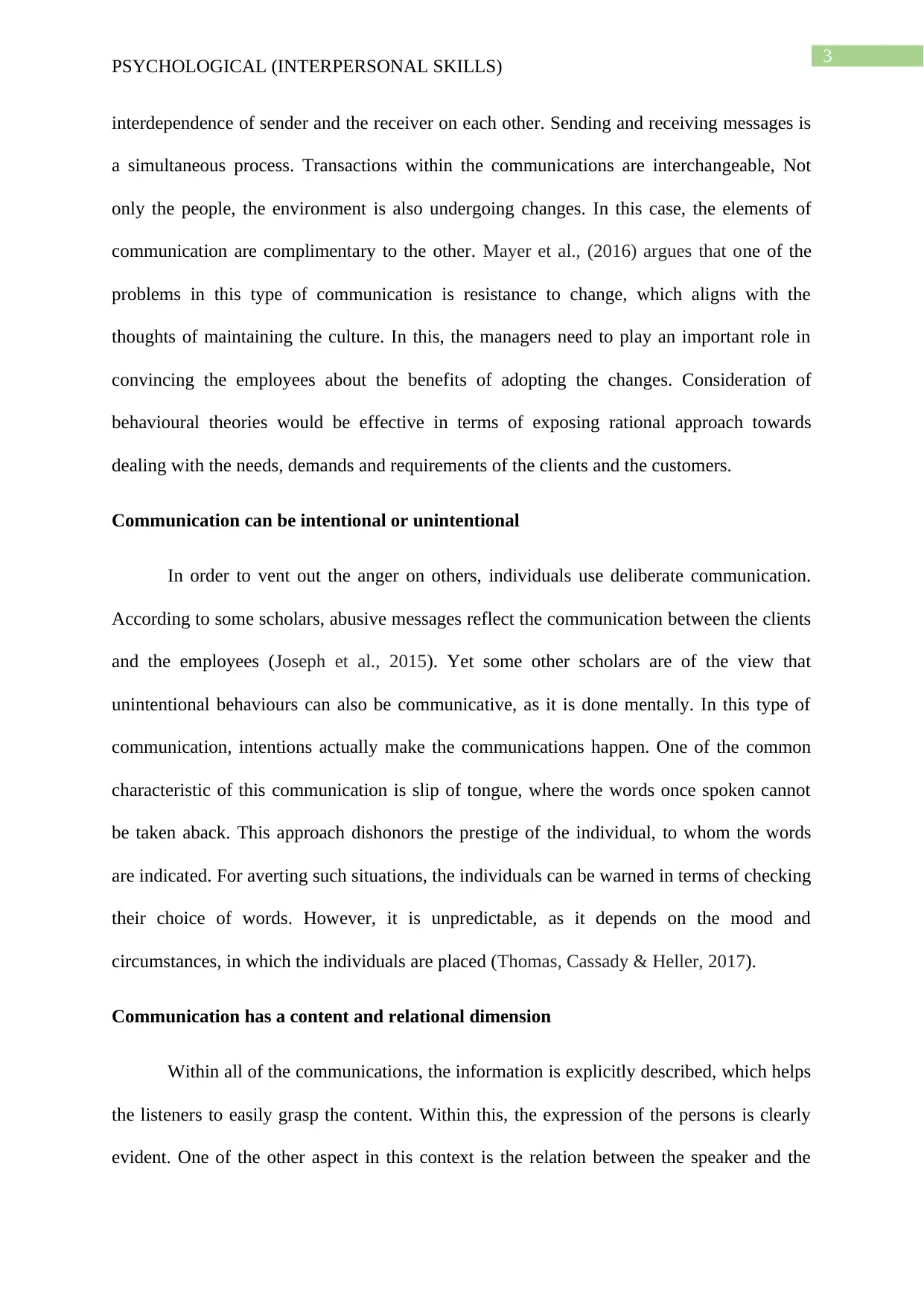
3
PSYCHOLOGICAL (INTERPERSONAL SKILLS)
interdependence of sender and the receiver on each other. Sending and receiving messages is
a simultaneous process. Transactions within the communications are interchangeable, Not
only the people, the environment is also undergoing changes. In this case, the elements of
communication are complimentary to the other. Mayer et al., (2016) argues that one of the
problems in this type of communication is resistance to change, which aligns with the
thoughts of maintaining the culture. In this, the managers need to play an important role in
convincing the employees about the benefits of adopting the changes. Consideration of
behavioural theories would be effective in terms of exposing rational approach towards
dealing with the needs, demands and requirements of the clients and the customers.
Communication can be intentional or unintentional
In order to vent out the anger on others, individuals use deliberate communication.
According to some scholars, abusive messages reflect the communication between the clients
and the employees (Joseph et al., 2015). Yet some other scholars are of the view that
unintentional behaviours can also be communicative, as it is done mentally. In this type of
communication, intentions actually make the communications happen. One of the common
characteristic of this communication is slip of tongue, where the words once spoken cannot
be taken aback. This approach dishonors the prestige of the individual, to whom the words
are indicated. For averting such situations, the individuals can be warned in terms of checking
their choice of words. However, it is unpredictable, as it depends on the mood and
circumstances, in which the individuals are placed (Thomas, Cassady & Heller, 2017).
Communication has a content and relational dimension
Within all of the communications, the information is explicitly described, which helps
the listeners to easily grasp the content. Within this, the expression of the persons is clearly
evident. One of the other aspect in this context is the relation between the speaker and the
PSYCHOLOGICAL (INTERPERSONAL SKILLS)
interdependence of sender and the receiver on each other. Sending and receiving messages is
a simultaneous process. Transactions within the communications are interchangeable, Not
only the people, the environment is also undergoing changes. In this case, the elements of
communication are complimentary to the other. Mayer et al., (2016) argues that one of the
problems in this type of communication is resistance to change, which aligns with the
thoughts of maintaining the culture. In this, the managers need to play an important role in
convincing the employees about the benefits of adopting the changes. Consideration of
behavioural theories would be effective in terms of exposing rational approach towards
dealing with the needs, demands and requirements of the clients and the customers.
Communication can be intentional or unintentional
In order to vent out the anger on others, individuals use deliberate communication.
According to some scholars, abusive messages reflect the communication between the clients
and the employees (Joseph et al., 2015). Yet some other scholars are of the view that
unintentional behaviours can also be communicative, as it is done mentally. In this type of
communication, intentions actually make the communications happen. One of the common
characteristic of this communication is slip of tongue, where the words once spoken cannot
be taken aback. This approach dishonors the prestige of the individual, to whom the words
are indicated. For averting such situations, the individuals can be warned in terms of checking
their choice of words. However, it is unpredictable, as it depends on the mood and
circumstances, in which the individuals are placed (Thomas, Cassady & Heller, 2017).
Communication has a content and relational dimension
Within all of the communications, the information is explicitly described, which helps
the listeners to easily grasp the content. Within this, the expression of the persons is clearly
evident. One of the other aspect in this context is the relation between the speaker and the
Paraphrase This Document
Need a fresh take? Get an instant paraphrase of this document with our AI Paraphraser
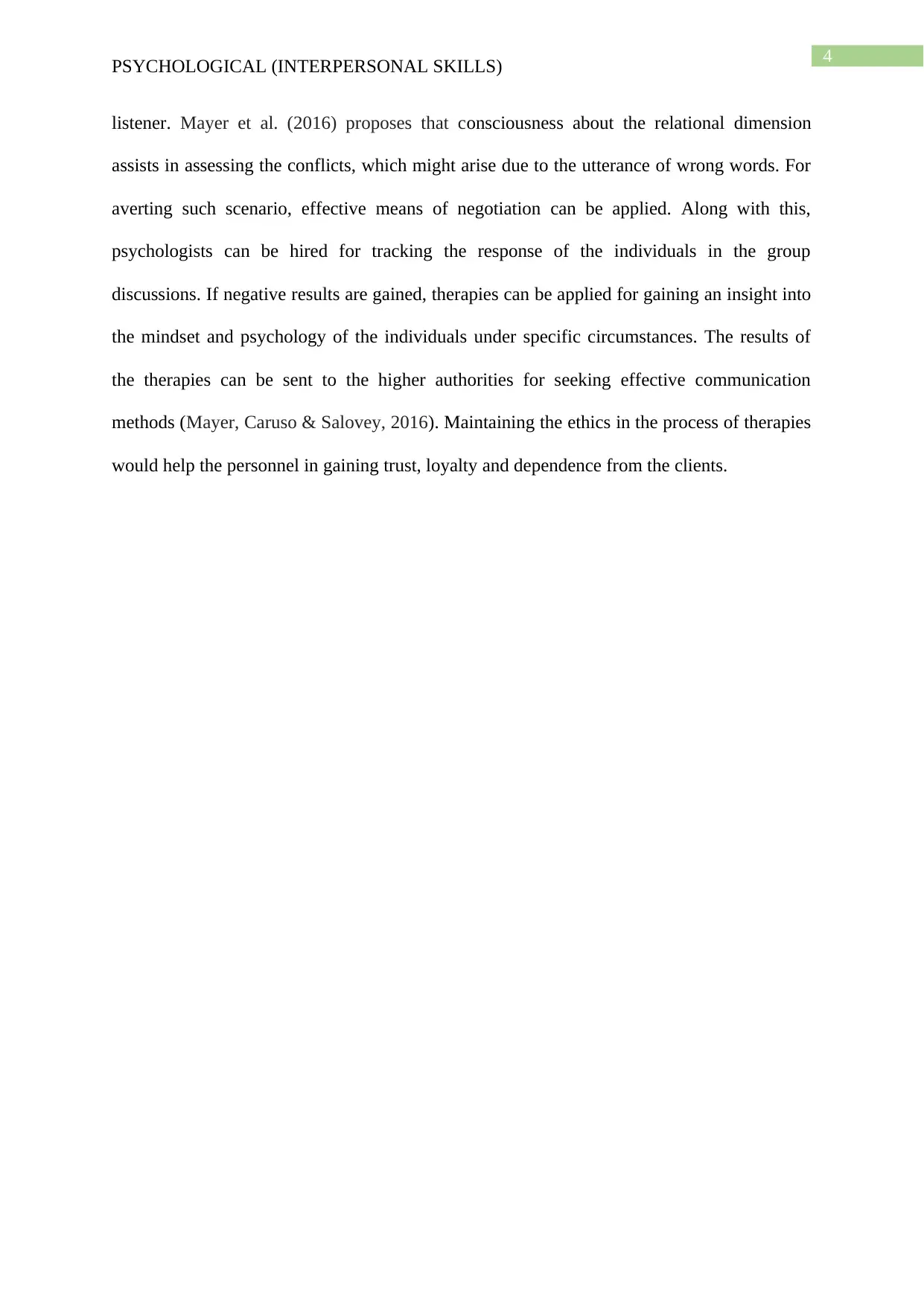
4
PSYCHOLOGICAL (INTERPERSONAL SKILLS)
listener. Mayer et al. (2016) proposes that consciousness about the relational dimension
assists in assessing the conflicts, which might arise due to the utterance of wrong words. For
averting such scenario, effective means of negotiation can be applied. Along with this,
psychologists can be hired for tracking the response of the individuals in the group
discussions. If negative results are gained, therapies can be applied for gaining an insight into
the mindset and psychology of the individuals under specific circumstances. The results of
the therapies can be sent to the higher authorities for seeking effective communication
methods (Mayer, Caruso & Salovey, 2016). Maintaining the ethics in the process of therapies
would help the personnel in gaining trust, loyalty and dependence from the clients.
PSYCHOLOGICAL (INTERPERSONAL SKILLS)
listener. Mayer et al. (2016) proposes that consciousness about the relational dimension
assists in assessing the conflicts, which might arise due to the utterance of wrong words. For
averting such scenario, effective means of negotiation can be applied. Along with this,
psychologists can be hired for tracking the response of the individuals in the group
discussions. If negative results are gained, therapies can be applied for gaining an insight into
the mindset and psychology of the individuals under specific circumstances. The results of
the therapies can be sent to the higher authorities for seeking effective communication
methods (Mayer, Caruso & Salovey, 2016). Maintaining the ethics in the process of therapies
would help the personnel in gaining trust, loyalty and dependence from the clients.
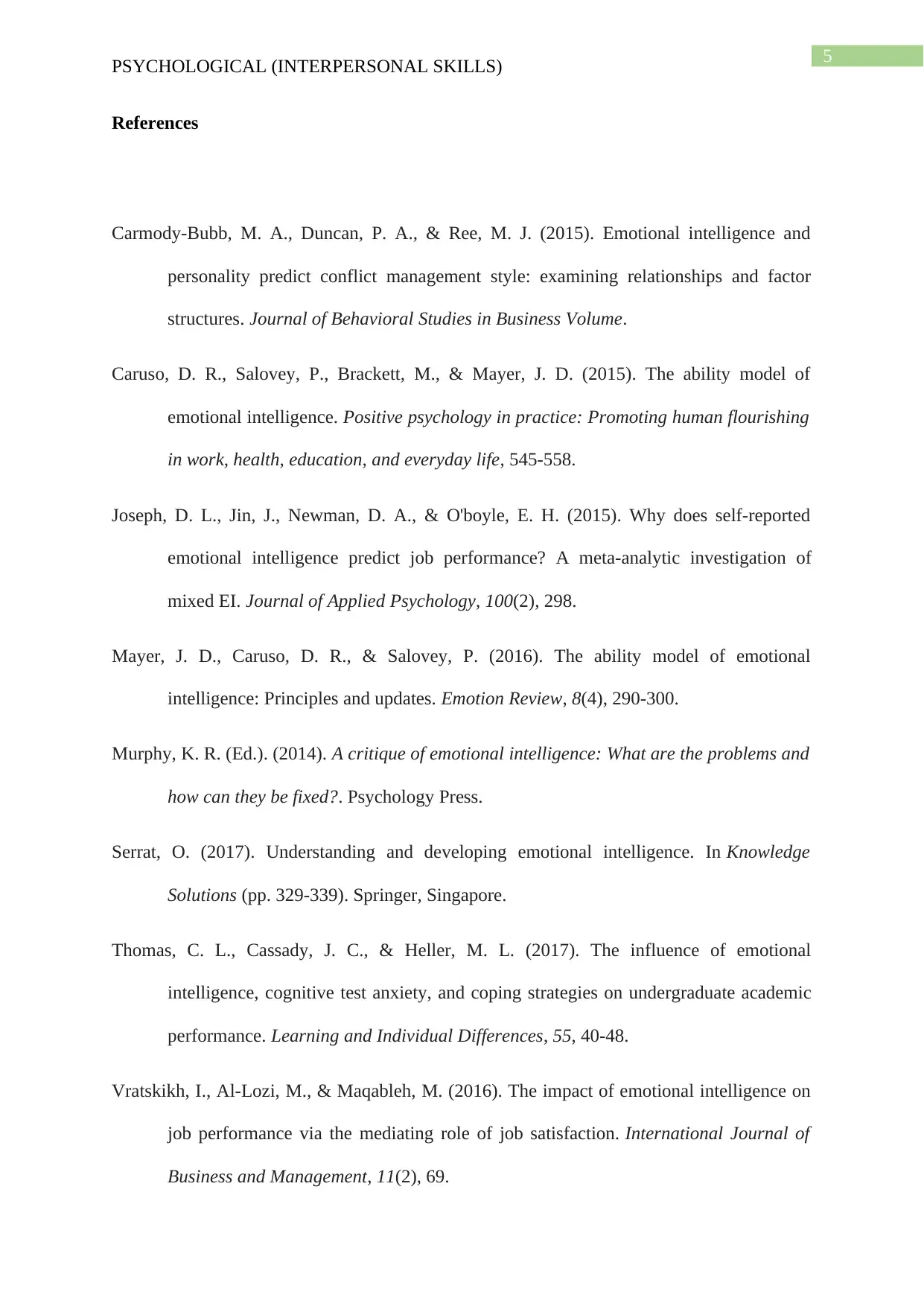
5
PSYCHOLOGICAL (INTERPERSONAL SKILLS)
References
Carmody-Bubb, M. A., Duncan, P. A., & Ree, M. J. (2015). Emotional intelligence and
personality predict conflict management style: examining relationships and factor
structures. Journal of Behavioral Studies in Business Volume.
Caruso, D. R., Salovey, P., Brackett, M., & Mayer, J. D. (2015). The ability model of
emotional intelligence. Positive psychology in practice: Promoting human flourishing
in work, health, education, and everyday life, 545-558.
Joseph, D. L., Jin, J., Newman, D. A., & O'boyle, E. H. (2015). Why does self-reported
emotional intelligence predict job performance? A meta-analytic investigation of
mixed EI. Journal of Applied Psychology, 100(2), 298.
Mayer, J. D., Caruso, D. R., & Salovey, P. (2016). The ability model of emotional
intelligence: Principles and updates. Emotion Review, 8(4), 290-300.
Murphy, K. R. (Ed.). (2014). A critique of emotional intelligence: What are the problems and
how can they be fixed?. Psychology Press.
Serrat, O. (2017). Understanding and developing emotional intelligence. In Knowledge
Solutions (pp. 329-339). Springer, Singapore.
Thomas, C. L., Cassady, J. C., & Heller, M. L. (2017). The influence of emotional
intelligence, cognitive test anxiety, and coping strategies on undergraduate academic
performance. Learning and Individual Differences, 55, 40-48.
Vratskikh, I., Al-Lozi, M., & Maqableh, M. (2016). The impact of emotional intelligence on
job performance via the mediating role of job satisfaction. International Journal of
Business and Management, 11(2), 69.
PSYCHOLOGICAL (INTERPERSONAL SKILLS)
References
Carmody-Bubb, M. A., Duncan, P. A., & Ree, M. J. (2015). Emotional intelligence and
personality predict conflict management style: examining relationships and factor
structures. Journal of Behavioral Studies in Business Volume.
Caruso, D. R., Salovey, P., Brackett, M., & Mayer, J. D. (2015). The ability model of
emotional intelligence. Positive psychology in practice: Promoting human flourishing
in work, health, education, and everyday life, 545-558.
Joseph, D. L., Jin, J., Newman, D. A., & O'boyle, E. H. (2015). Why does self-reported
emotional intelligence predict job performance? A meta-analytic investigation of
mixed EI. Journal of Applied Psychology, 100(2), 298.
Mayer, J. D., Caruso, D. R., & Salovey, P. (2016). The ability model of emotional
intelligence: Principles and updates. Emotion Review, 8(4), 290-300.
Murphy, K. R. (Ed.). (2014). A critique of emotional intelligence: What are the problems and
how can they be fixed?. Psychology Press.
Serrat, O. (2017). Understanding and developing emotional intelligence. In Knowledge
Solutions (pp. 329-339). Springer, Singapore.
Thomas, C. L., Cassady, J. C., & Heller, M. L. (2017). The influence of emotional
intelligence, cognitive test anxiety, and coping strategies on undergraduate academic
performance. Learning and Individual Differences, 55, 40-48.
Vratskikh, I., Al-Lozi, M., & Maqableh, M. (2016). The impact of emotional intelligence on
job performance via the mediating role of job satisfaction. International Journal of
Business and Management, 11(2), 69.
⊘ This is a preview!⊘
Do you want full access?
Subscribe today to unlock all pages.

Trusted by 1+ million students worldwide
1 out of 6
Related Documents
Your All-in-One AI-Powered Toolkit for Academic Success.
+13062052269
info@desklib.com
Available 24*7 on WhatsApp / Email
![[object Object]](/_next/static/media/star-bottom.7253800d.svg)
Unlock your academic potential
Copyright © 2020–2025 A2Z Services. All Rights Reserved. Developed and managed by ZUCOL.




